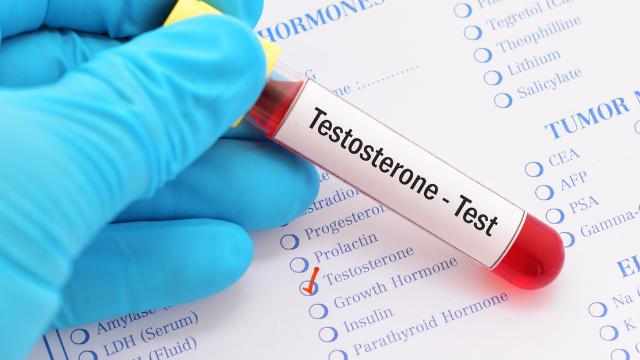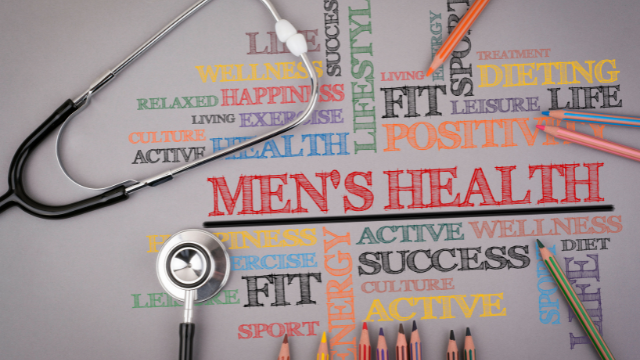Are you considering adopting a plant-based diet but worried about its impact on your testosterone levels? You don't have to worry, a plant-based diet doesn't lower testosterone levels! Recent research has come to light debunking the myth that a plant-based diet lowers testosterone.
In fact, studies conducted on US adults have shown no association between the content of plant-based foods in one's diet and testosterone levels. This exciting finding opens up a world of possibilities for those seeking to embrace a plant-based lifestyle without compromising their hormonal balance.
In this article, we will delve deeper into the study's findings and explore the potential benefits of a plant-based diet. We will debunk myths and misconceptions surrounding the topic while providing evidence-based insights into how a well-rounded plant-based diet can support overall health and well-being.
Whether you're curious about optimizing hormonal balance or simply looking for ways to enhance your overall health, this article aims to provide you with valuable information and guidance on embracing a plant-based lifestyle without sacrificing testosterone levels.
So, let's dive in and discover the truth behind the relationship between a vegan diet and testosterone!
Key Takeaways
- Plant-based diets have anti-inflammatory properties that reduce chronic inflammation.
- Research shows plant-based diets do not lower testosterone levels in US adults.
- Plant-based diets support hormone synthesis and regulation.
- Plant-based diets promote overall health through weight management and reduced inflammation.
Does a Vegan Diet Affect Testosterone?
No need to worry; going vegan won't negatively affect your testosterone levels! There is a common misconception that a plant-based diet can lower testosterone, but multiple studies have shown that this is not the case.
- In fact, research has consistently found no significant difference in testosterone levels between individuals following a vegan or vegetarian diet compared to those who consume animal products.
- Protein is often a concern when it comes to plant-based diets and testosterone levels. However, studies have shown that as long as you consume an adequate amount of protein from plant sources such as legumes, tofu, tempeh, and quinoa, you can meet your body's needs without compromising testosterone production.
- It's important to note that excessive protein intake does not equate to higher testosterone levels. The key is finding the right balance and variety of plant-based protein sources in your diet.
- Furthermore, adopting a vegan diet can actually benefit overall health and well-being. Research suggests that plant-based diets may reduce the risk of chronic diseases such as heart disease, certain types of cancer, and obesity. These health benefits are likely due to the high fiber content and nutrient-rich nature of plant foods.
- Additionally, iron deficiency can sometimes be a concern for vegans due to the absence of heme iron found in animal products.However, with proper planning and incorporation of iron-rich plant foods like lentils, legumes and pulses, spinach, and fortified cereals into your meals, you can easily meet your iron needs on a vegan diet. There is no need to worry about a vegan diet negatively impacting your testosterone levels.
As long as you ensure an adequate intake of protein from various plant sources and pay attention to meeting all your nutritional needs through a balanced approach to eating whole foods rich in nutrients like iron on a regular basis, it should not pose any negative effects on your hormone levels or overall health.
So go ahead and embrace the many benefits of a plant-based lifestyle while enjoying the diverse and delicious offerings that come with it.
Testosterone Levels in Adults According to a study
Contrary to popular belief, a plant-focused eating plan can maintain healthy testosterone levels in US adults. Many people mistakenly assume that a vegan diet may lead to lower testosterone levels, but research suggests otherwise.
- In fact, studies have shown that there is no significant difference in testosterone levels between individuals who follow a plant-based diet and those who consume animal products.
- The study aimed to assess the correlation between the plant-based content of diet and serum testosterone levels in men using data from the national health and nutrition examination survey (NHANES) database.
- There were 191 participants included in the study, with an average age of 45 years (ranging from 30 to 60 years). The study concluded that there is no association between plant-based food content in diet and serum testosterone levels.
One factor that may influence testosterone levels is body mass. It is well-known that maintaining a healthy weight is vital for overall health, including hormone balance.
Studies have found that individuals following a plant-based diet tend to have lower body mass indexes (BMIs) compared to those consuming animal products. A healthy BMI has been associated with optimal testosterone levels and reduced risk of diseases such as heart disease.
To ensure that you have a healthy BMI
- Ensure that you are eating a well-planned and healthy plant-based diet
- Check if you are incorporating all the various macro and micro nutrients on a plant-based diet
- Use Dr. Greger's Daily Dozen to plan your meals for optimal health
- Don't cut out food groups lentils, pulses, legumes, nuts and seeds for optimal health
- Eat enough calories everyday
- Adopt strength training practices
By embracing a plant-focused lifestyle, you can nourish your body with nutrient-dense foods while supporting your hormonal health at the same time.
Association with Plant-Based Content
Don't be fooled by misconceptions, a plant-focused eating plan can actually support healthy testosterone levels in adults. Contrary to popular belief, adopting a plant-based diet does not lead to lower testosterone levels.
In fact, research has shown that there is no significant association between the consumption of plant-based foods and a decrease in testosterone levels among adults in a study conducted in the United States.
Eating a plant-based diet can provide numerous health benefits while still maintaining optimal levels of testosterone. A balanced diet with fruits, vegetables, legumes, and whole grains are rich in essential nutrients that support overall well-being.
These foods are often packed with vitamins, minerals, and antioxidants that promote hormonal balance and enhance reproductive health. By incorporating a variety of vegan foods into your daily meals, you can ensure that you're getting all the necessary nutrients for maintaining healthy testosterone levels.
For example, soy products like tofu and tempeh contain phytoestrogens which have been found to have no adverse effects on testosterone levels. Additionally, including nuts and seeds in your diet provides essential fatty acids like omega-3s which help support hormone production.
To maintain balanced hormone levels while following a plant-based diet, it's important to focus on consuming a wide range of nutrient-dense foods. This includes incorporating sources of protein such as beans, lentils, quinoa, and seitan into your meals. Ensuring an adequate intake of zinc-rich foods like pumpkin seeds and spinach is also crucial for promoting healthy testosterone synthesis.
Research Findings
Surprisingly, adopting a plant-focused eating plan can actually have a positive impact on testosterone levels among US adults. Research findings suggest that there is no significant association between a plant-based diet and lower testosterone levels.
In fact, studies have shown that individuals who follow a plant-based diet tend to have normal or even higher testosterone levels compared to those who consume animal foods. This challenges the misconception that only animal foods can provide the necessary nutrients for optimal hormone levels.
One possible reason for this is the abundance of nutrients found in plant-based diets. Vegetables, fruits, whole grains, legumes, and nuts are rich sources of vitamins, minerals, and antioxidants that support overall health and well-being.
These nutrient-dense foods provide essential components for hormone synthesis and regulation in the body. Additionally, they are also low in saturated fats, while saturated fats have been linked with decreased testosterone production.
Furthermore, plant-based diets may have positive effects on testosterone levels by promoting weight management and reducing inflammation. Excess body fat has been associated with hormonal imbalances, including lower testosterone levels.
Individuals who eat a diet with lots of whole plant foods like fruits, vegetables, green vegetables, leafy vegetables, whole grains, pulses, lentils and legumes, nuts and seeds, herbs and spices are more likely to maintain a healthy weight due to the higher fiber content and lower calorie density of these foods.
The nutrient-rich nature of such diets provides adequate support for hormone synthesis and regulation while promoting overall health through weight management and reduced inflammation.
So if you're considering switching to a plant-focused eating plan, rest assured that it won't negatively impact your testosterone levels; instead, it might just contribute positively to your overall well-being.
Health Benefits of a Plant-Based Diet
If you're looking to improve your health, a plant-focused eating plan can offer numerous benefits. A plant-based diet is rich in essential nutrients such as vitamins, minerals, and antioxidants that are crucial for maintaining optimal health.
By consuming a variety of plant-based foods such as fruits, vegetables, legumes, whole grains, nuts and seeds, you provide your body with the necessary components it needs to function at its best.
- One of the key health benefits of a plant-based diet is its ability to support heart health. Research has shown that individuals who follow a plant-based eating pattern avoiding or minimising dairy products have lower cholesterol levels and a reduced risk of heart disease compared to those who consume animal products.
- Plant-based diets are typically low in saturated fats and high in fiber, which helps to lower cholesterol levels and maintain healthy blood pressure. In addition to promoting heart health, a plant-based diet can also positively impact testosterone levels.
- Contrary to popular belief, studies have found no evidence suggesting that a plant-focused eating plan lowers testosterone levels in men. In fact, some research suggests that certain components found in plants, such as omega-3 fatty acids and calcium, may actually help support healthy testosterone production.
- Overall, adopting a plant-based diet can be an excellent choice for improving your overall well-being. Not only does it provide essential nutrients like omega fatty acids and calcium for optimal bodily functions, but it also supports heart health by reducing cholesterol levels and maintaining healthy blood pressure.
Rest assured that choosing a plant-focused eating plan won't negatively affect your testosterone levels; instead, it offers numerous health benefits that contribute to your overall vitality and longevity.
Myths and Misconceptions
You'll be amazed to discover the truth behind the misconceptions surrounding a plant-focused eating plan and its impact on your testosterone levels. Many people believe that a plant-based diet can lower testosterone levels, but this is simply not true.
In fact, research has shown that there is no significant difference in testosterone levels between individuals who follow a vegan or vegetarian diet and those who consume animal-based foods. So, if you're worried about maintaining healthy testosterone levels, rest assured that a well-planned vegan diet can support this.
One of the main reasons why people think that a plant-based diet may lower testosterone levels is because of the misconception that soy products increase estrogen levels in men.
However, studies have consistently shown that consuming soy does not affect estrogen or testosterone levels in men. In fact, soy has been found to have numerous health benefits and may even reduce the risk of certain cancers.
Another misconception surrounding plant-based diets and testosterone is the belief that only animal-based foods can provide adequate nutrients for hormone production. This couldn't be further from the truth. A healthy plant-based diet can provide all the necessary nutrients for maintaining normal testosterone levels.
By including a variety of whole grains, legumes, nuts, seeds, fruits, and vegetables in your diet, you can ensure that you're getting all the essential vitamins and minerals needed for hormonal balance.
In addition to supporting healthy testosterone levels, a plant-based diet offers numerous other health benefits. Research has shown that individuals who follow a well-planned vegan or vegetarian eating plan have a lower risk of heart disease compared to those who consume animal products.
Plant-based diets are typically high in fiber and low in saturated fat, which are both crucial factors for cardiovascular health.
It's important to remember that maintaining healthy testosterone levels is not solely dependent on the type of diet you follow but also on overall lifestyle choices and genetics.
So, embrace a healthy plant-based diet and enjoy the numerous benefits it offers for your overall well-being.
Considerations for Men's Health
Achieving optimal men's health involves considering various factors beyond just dietary choices, allowing you to cultivate a well-rounded approach toward your overall well-being. When it comes to men's health, one aspect that often raises concerns is the impact of a plant-based diet on testosterone levels.
However, observational studies have consistently shown that there is no significant difference in serum testosterone levels between individuals following a plant-based diet and those consuming animal products.
This suggests that adopting a plant-based lifestyle does not inherently lower testosterone levels. It is important to note that adequate protein intake is crucial for maintaining optimal testosterone production.
While some may argue that plant-based diets lack essential amino acids necessary for testosterone synthesis, this concern can be easily addressed by incorporating diverse sources of protein into your meals.
Plant-based protein sources such as legumes, tofu, tempeh, seitan, and quinoa are all excellent options rich in essential amino acids. By including these foods in your diet regularly, you can ensure sufficient protein intake to support healthy testosterone levels.
In addition to protein, another nutrient worth considering for men's health is iron. Low iron levels have been associated with decreased blood testosterone levels in men. Fortunately, plant-based diets provide ample sources of iron through foods like spinach, lentils, chickpeas, pumpkin seeds, and fortified cereals.
By including these iron-rich foods in your meals alongside other essential nutrients from fruits and vegetables, whole grains, and healthy fats like nuts and seeds or avocados - you can create a well-balanced whole food plant-based diet that supports both your overall health and hormone production.
Overall, it is clear from observational studies that adopting a plant-based diet does not negatively affect testosterone production or lower serum testosterone levels.
By incorporating diverse sources of protein and ensuring adequate iron intake from plant-based foods into your meals daily, you can confidently embrace a plant-based lifestyle while still supporting optimal men's health.
Remember that achieving holistic well-being goes beyond just dietary choices, and it is essential to consider other factors such as regular exercise, stress management, and sufficient sleep to maintain a balanced approach toward your overall health.
Optimizing Hormonal Balance
To optimize your hormonal balance, it's important to consider various factors beyond just dietary choices. While a plant-based diet can provide numerous health benefits, including improved heart health and lower risk of chronic diseases, optimizing your hormonal balance requires a holistic approach.
Here are some key considerations to keep in mind:
-
Lifestyle Factors: Apart from diet, factors such as stress levels, sleep quality, exercise routine, and body weight can all impact your hormonal balance. Chronic stress and lack of sleep can disrupt hormone production and regulation in the body. Regular physical activity and maintaining a healthy weight can help support optimal hormone levels.
-
Healthy Fats: Including healthy fats in your diet is crucial for hormone production and brain function. While vegetables can be part of a plant-based diet, it's essential to choose sources that are rich in omega-3 fatty acids, like flaxseeds or chia seeds. These fats play an essential role in cell membrane structure and function, including hormone receptors.
-
Micronutrients: Ensuring adequate intake of micronutrients is also important for optimal hormonal balance. Certain vitamins and minerals like vitamin D, zinc, magnesium, and B vitamins have been shown to support testosterone production and overall hormone regulation in the body. Including a variety of plant-based foods like leafy greens, legumes, nuts/seeds, whole grains can help provide these essential nutrients.
Remember that individual variations exist when it comes to hormones; what works for one person may not work for another due to differences in genetic makeup or underlying health conditions.
It's always best to consult with a healthcare professional who specializes in hormones if you have concerns about your testosterone levels or overall hormonal health.
Frequently Asked Questions
Can a vegan diet negatively impact testosterone levels in men?
A vegan diet won't negatively impact your testosterone levels. In fact, studies show that plant-based diets have no significant effect on testosterone in men. So you can enjoy the health benefits of a vegan lifestyle worry-free!
Are there any specific foods in a plant-based diet that can boost testosterone levels?
There are specific foods in a plant-based diet that can boost testosterone levels, such as cruciferous vegetables, nuts and seeds, healthy fats like avocados and olive oil, and soy products. These foods provide essential nutrients for hormone production and overall health.
Does the association between plant-based content in the diet and testosterone levels differ in men and women?
The association between plant-based content in the diet and testosterone levels differs in men and women. Research shows that a plant-based diet may have varying effects on testosterone levels depending on gender, but more studies are needed for a conclusive answer.
Are there any specific guidelines or recommendations for men looking to maintain optimal testosterone levels on a plant-based diet?
To maintain optimal testosterone levels on a plant-based diet, focus on consuming a diverse range of whole foods such as legumes, nuts, seeds, and leafy greens. Incorporating regular exercise and managing stress can also support hormonal balance. Remember, you've got the power to thrive!
Conclusion
In conclusion, the study on US adults has debunked the myth that a plant-based diet lowers testosterone levels. The evidence clearly shows that there is no association between consuming plant-based foods and decreased testosterone levels.
So, if you've been considering adopting a vegan or plant-based diet, rest assured that it won't have any negative impact on your hormonal balance.
To illustrate this point further, let's imagine your body as a well-tuned engine. Testosterone is like the fuel that keeps this engine running smoothly, ensuring optimal performance and vitality.
Many people believe that by eliminating animal products from their diet, they'll be depriving their bodies of this essential fuel.
However, just like there are alternative sources of energy for engines, such as electricity or hydrogen fuel cells, there are also plenty of plant-based foods that can provide the necessary nutrients to support healthy testosterone levels.
Take legumes, for example - they're packed with protein, fiber, and other essential vitamins and minerals that promote overall health and well-being. These powerhouse plants not only nourish your body but also help optimize hormonal balance without compromising testosterone levels.
So just like choosing an alternative source of energy for an engine doesn't affect its performance negatively, opting for a plant-based diet won't hinder your hormonal balance either.
In summary, it's clear from the research findings that a vegan or plant-based diet does not lower testosterone levels in adults. In fact, embracing this dietary lifestyle can offer numerous health benefits while supporting optimal hormone production.
Remember, by steering clear of processed foods and animal products and by opting for a diverse range of nutrient-rich plant-based foods, you can achieve optimal health, attain hormonal balance, and enhance your overall well-being.
Next Steps
Congratulations! Now you know for a fact that plant-based diets doesn't lower testosterone levels, while has various health benefits and is considered as the healthiest diet out there.
Here are some effective steps you can take to make a transition to a whole food plant-based diet and benefit your overall well-being:
- Book a consultation with Dr. Achyuthan Eswar for a personalized medical consultation to prevent, treat and better manage lifestyle diseases through diet and lifestyle.
- Learn to cook delicious whole food plant based goodies and sign up for courses on health and wellness from the comfort of you home. Join our online courses from anywhere in the world.
- Get daily essentials to cook healthy meals at home.
- Stock up on delicious sweets and snacks that are sugar/jaggery-free, oil-free, maida-free and plant-based - Available Pan-India.










